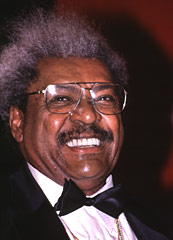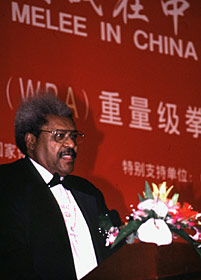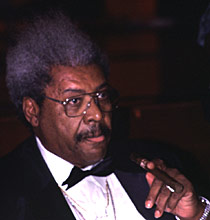Don King does Beijing
Vegas schmaltz might seem an odd mixer in China, which long ago eradicated western indulgences like gambling and boxing. Yet Beijing opened its arms to boisterous fight promoter Don King, who plans to bring the biggest bout to the PRC since the Civil War.
By Ron Gluckman /Beijing
WE MIGHT HAVE HAD THE BRAWL AT THE WALL. Or better yet, Ra-ging in Be-jing! But bombastic boxing promoter Don King, who peppers even his dinner chatter with K.O.-punch platitudes, said he was feeling uncharacteristically demur when he pondered the billing for his next bout.
"Given the recent tension between our two great countries," he said, referring to rocky Sino-American relations over the recent downing of a spy plane, "I wanted to downplay things."
 Yet,
subtlety is an even longer stretch for the flamboyant Mr. King than his
self-styled role as an international statesman. Hence, the Grand Don who gave
the world "Thrilla In Manila" and "Rumble in the Jungle" has
dubbed the mainlandís first title fight, set for August 5, "the Melee in
China."
Yet,
subtlety is an even longer stretch for the flamboyant Mr. King than his
self-styled role as an international statesman. Hence, the Grand Don who gave
the world "Thrilla In Manila" and "Rumble in the Jungle" has
dubbed the mainlandís first title fight, set for August 5, "the Melee in
China."
In the razzle-dazzle, boisterous bellows of Don-speak, that passes for subdued. The splashy Mr. King, with beefy prizefighters Evander Holyfield and John Ruiz in tow, took Beijing by storm during a promotional tour in late May (2001). Received in a style normally reserved for world leaders, Mr. King rolled around in a black limousine and relentlessly blared his enthusiasm for all things Chinese.
"I LOVE China. I LOVE the Chinese people," said Mr. King, who speaks in rich, southern tones, littered with capital letters. "The Chinese have been wonderful.
"I even had an audience with the president," he boasted, ratcheting up the volume. "They DONíT treat a BLACK man like that back home."
Mr. Kingís red-carpet reception culminated in a gala banquet at Beijing Hotel, just a few blocks from Tiananmen Square and the source, he reiterated often, of great inspiration. Maoís Mausoleum, where the Great Helmsmanís body lies in state, "was the most impressive thing Iíve seen. I was in awe. I was speechless."
If so, that was another first. At the Beijing Hotel, Mr. King was anything but. Chomping a cigar, the boxing magnate preened, posed for pictures and never paused for a breath. Critics say he is more shyster than star, but he certainly sparkled. Dangling around Mr. Kingís neck, on a diamond-studded necklace, was a jeweled crown, the name Don set inside, in still more diamonds.
 Mr.
King was in radiant form, apocalyptic-afro styled sky-high in full
gravity-defying glory. His roller-coaster voice soared to the rafters in a
scream-song style that somehow melded Martin Luther King, Jr. with John Coltrane.
An awesome, but erratic orator, he bounced around like boxingís Lenny Bruce,
delivering a free-form bebop ramble that blended quotes from John F. Kennedy,
Deng Xiaoping and George Bernard Shaw.
Mr.
King was in radiant form, apocalyptic-afro styled sky-high in full
gravity-defying glory. His roller-coaster voice soared to the rafters in a
scream-song style that somehow melded Martin Luther King, Jr. with John Coltrane.
An awesome, but erratic orator, he bounced around like boxingís Lenny Bruce,
delivering a free-form bebop ramble that blended quotes from John F. Kennedy,
Deng Xiaoping and George Bernard Shaw.
Yet heads wagged as Mr. King paraphrased speeches by Mao and Abraham Lincoln, suggesting that the founder of the Peopleís Republic and the American president had advocated essentially the same style of governance, "of the people, by the people, and for the people." Mr. King also praised Chairman Mao and "the yearning for freedom burning in the Chinese breast" in the same breath, leaving many entertained but obviously baffled. One executive with a television sports network whispered: "Itís all in code."
Since bursting onto the boxing scene a quarter of a century ago, Mr. King has been almost as renowned for his ruthless opportunism as his showmanship. In fact, several fighters have filed suit to stop the Beijing title bout, asserting alternate claims of first contender-status. Mr. Kingís response might well be admired by Chinese leadership; he has signed representation deals with some of the fighters and promised others slots on the Beijing billing. In all, there may be four matches in the Beijing extravaganza, which will cost $40 million to stage.
The main event will be another rematch between four-time champion Holyfield and Mr. Ruiz, who stripped Mr. Holyfield of one heavyweight belt in March. While Mr. King promises a star-studded evening in Beijing, the global audience is vastly more important. When Mr. Holyfield fought Mike Tyson, more than two billion people watched in 100 nations.
Yet Mr. King claimed money isnít his motivation. Evoking Mao again, he said bringing boxing to China has been his own "Long March." He added: "I am one of the masses, not the classes. Iím with the peasants. Thatís my whole bailiwick."
In perhaps the strangest turn on a tour filled with strange events Mr. King was queried about opportunism by the normally unquestioning Chinese media. "The profits for me in this event is the better understanding, respect and appreciation of the Chinese people," he responded. Then, chewing his cigar, he added: "Recognize and respect, though, I AM a CAPITALIST. I like MAKING MONEY."
 Even
in the rough-and-tumble world of fighting, some see this pairing as the ultimate
odd coupling. After all, the P.R.C. long ago banned professional boxing, and
China has virtually no experience with pay-for-view television, the mainstay of
modern prizefighting. Yet, switch on a TV here and watch a barrage of
advertisements for stain removers, miracle growth formulas and ab-shapers.
Betting may be illegal in China, but most infrastructure is in place for
Saturday afternoon extravaganzas, be they boxing, wrestling or roller derby.
Even
in the rough-and-tumble world of fighting, some see this pairing as the ultimate
odd coupling. After all, the P.R.C. long ago banned professional boxing, and
China has virtually no experience with pay-for-view television, the mainstay of
modern prizefighting. Yet, switch on a TV here and watch a barrage of
advertisements for stain removers, miracle growth formulas and ab-shapers.
Betting may be illegal in China, but most infrastructure is in place for
Saturday afternoon extravaganzas, be they boxing, wrestling or roller derby.
For its part, China is on a fast-track to build a reputation as a world-class sports center. Most analysts consider the fight one more stepping stone in Beijingís drive to win the 2,008 Olympics. Hence, the fanfare throughout the visit of Mr. King, who obliged by touting the Olympics bid at every opportunity.
These self-serving partners may thus be a perfect fit: the promoter, oozing false Vegas glitz, imported to add some party color to the ultimate Mafia operation. But will it work? Mr. King has personality in spades, but the mainland screams out for a mega-transfusion. Bravo, a local ticketing guide, touts the fight thusly: "World Super Boxers Contend for Hegemony Crown Duel in China."
Hegemony is one of those weird English words you hear often in China, just never spoken by a native English speaker. The term refers to overbearing by world powers, and it sure gets mainland crowds hooting with nationalistic fervor. Itís just hard to imagine the banner on Showtime.
Still, Mr. King insists: "This is the biggest fight in 5,000 years of Chinese history." Or, at least, since Chiang Kai-shek vs. Mao. Now, that was a real Chinese title fight.
Ron Gluckman is an American reporter who is based in Hong Kong, but who roams around Asia for a number of publications, such as the Wall Street Journal, which ran this piece on the first weekend of June, 2001.
Days before the early-August fight, King's company announced that John Ruiz was injured, and boxers and the flamboyant promoter promptly packed out of Beijing. By then, of course, Beijing had won its Olympic bid, and the bout still had no Pay TV deal. King's people vowed to be back. Don't count on it!
To return to the opening page and index
push here
[right.htm]
